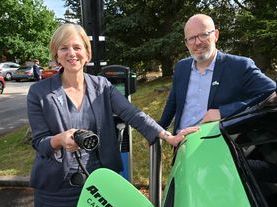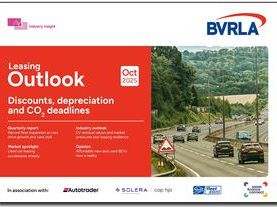The British Vehicle Rental and Leasing Association (BVRLA) has launched an ambitious ‘Plug-in Pledge’ that will see its members’ combined plug-in vehicle fleet size surge from 50,000 today to 720,000 by 2025.
The British Vehicle Rental and Leasing Association (BVRLA) has launched an ambitious ‘Plug-in Pledge’ that will see its members’ combined plug-in vehicle fleet size surge from 50,000 today to 720,000 by 2025.
By that time, vehicle rental and leasing companies will be buying 300,000 plug-in vehicles per year. This represents an increase in the industry’s share of annual new plug-in hybrid and pure electric vehicle registrations from 36% to 60%.
Only last week the Government reaffirmed its commitment to increase the number of electric and hybrid vehicles being driven in the UK through its ‘Road to Zero’ strategy. It outlined its ambition for 50%-70% of new car sales to be ultra-low emission by 2030 and emphasised the need for this transition to be industry-led.
The BVRLA’s ‘Plug-in Pledge’ demonstrates the vehicle rental and leasing industry’s commitment to playing a vital role in delivering this goal.
The association’s members are responsible for almost five million vehicles - 1-in-8 cars, 1-in-5 vans and 1-in-5 trucks on UK roads. Due to the number of vehicles they purchase and the frequency of fleet replacement cycles, they will be a key driver on the journey to zero emissions.
The BVRLA’s ‘Plug-in Pledge’ will rely on the Government providing vital support for the adoption of these vehicles. As recent polling by YouGov has shown, 42% of senior decision makers in small and medium-sized businesses who use vehicles, would be likely to increase the number of electric vehicles they use if national and local government were to offer greater support, for example in the form of tax incentives, free parking and more charging infrastructure.
To ensure that fleets can achieve this bold ‘Plug-in Pledge’ the association is calling on the Government to:
• Bring forward plug-in company car tax incentives now and not in 2020
• Provide a five-year commitment on plug-in vehicle incentives
• Offer more infrastructure support for businesses looking to deploy large plug-in fleets
BVRLA Chief Executive Gerry Keaney said:
“Over the last two decades, the fleet industry has embraced the introduction of emissions-based motoring taxes and used the incentives they provide to deliver a sustained and substantial reduction in CO2 emissions.
“Fleets are ready to make a large-scale transition to zero-emission motoring, providing that the Government can match their ambition with a supportive tax regime and more help with charging infrastructure.”
Responding to the BVRLA, Transport Minister Jesse Norman said:
“The coming decades are expected to be transformative for our motor industry, our national infrastructure and the way we travel. The Government has shown through the Road to Zero Strategy that setting clear ambitions for industry and consumers is key to bringing about this change.
“We want to work in partnership with industry and businesses to make these shared ambitions a reality, so we welcome the commitment made by BVRLA today.
“The measures set out in the Road to Zero strategy should help ensure that the UK remains a world leader for investment in and uptake of zero emission technologies. In addition to this, we are holding the world’s first Zero Emission Vehicle summit later this year in Birmingham, placing the UK at the heart of this technological revolution.”
The BVRLA’s ‘Plug-in Pledge’ will be launched at a Parliamentary Reception in the House of Commons on Monday 16th July, to an audience of BVRLA members, vehicle manufacturers, sustainable transport stakeholders, Government officials and supportive MPs.
Notes to editors:
1. BVRLA commissioned YouGov to poll British SMEs to ask ‘For the following question, please imagine the national and/ or local government were to more actively encourage businesses to use electric vehicles by providing charging infrastructure and incentives (e.g. free parking, more charge points, tax incentives, etc.) How likely, if at all, would your organisation be to use more electric vehicles than it currently does, if this were to happen?’
2. All figures, unless otherwise stated, are from YouGov Plc. Total sample size was 1043 adults. Question base was all SMEs who use vehicles (627 total). Fieldwork was undertaken between 11th - 18th June 2018. The survey was carried out online. The figures have been weighted and are representative of British SMEs.
3. Results by region mainly work (GOR):
• North West- Net likely 43%, Net unlikely 49% (61 sample size)
• Yorkshire and the Humber- Net likely 32%, Net unlikely 59% (60 sample size)
• West Midlands- Net likely 48%, Net unlikely 41% (59 sample size)
• London- Net likely 51%, Net unlikely 36% (100 sample size)
• South East- Net likely 42%, Net unlikely 45% (113 sample size)
• South West- Net likely 33%, Net unlikely 60% (65 sample size)
Any regional percentages calculated on bases fewer than 50 respondents are not reported in the above breakdown as they do not represent a wide enough cross-section of the target population to be considered statistically reliable.



